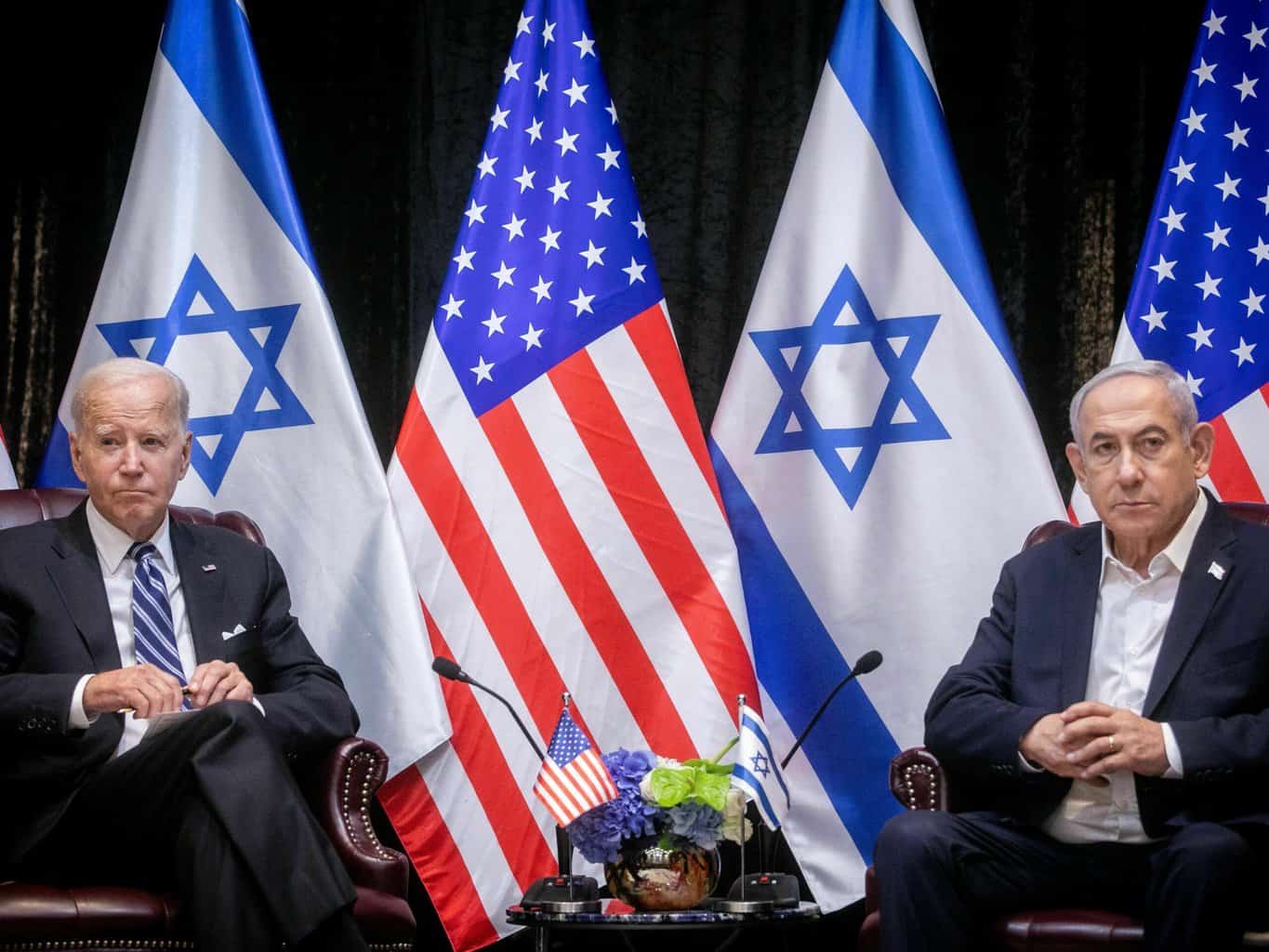Article
Netanyahu Cancels U.S.-Israel Meetings After U.S. Abstains from UN Ceasefire Resolution

US President Joe Biden (L), sits with Israeli Prime Minister Benjamin Netanyahu, at the start of the Israeli war cabinet meeting, in Tel Aviv on October 18, 2023, amid the ongoing battles between Israel and the Palestinian group Hamas. US President Joe Biden landed in Tel Aviv on October 18, 2023 as Middle East anger flared after hundreds were killed when a rocket struck a hospital in war-torn Gaza, with Israel and the Palestinians quick to trade blame. (Photo by Miriam Alster / POOL / AFP) (Photo by MIRIAM ALSTER/POOL/AFP via Getty Images)
In a move that continues to showcase the deepening divide between the United States and Israel, Israeli Prime Minister Benjamin Netanyahu has canceled a planned high-level delegation visit to Washington following the U.S. abstention from a United Nations Security Council resolution calling for an immediate ceasefire between Israel and Hamas.
The resolution passed during the holy month of Ramadan, marked a significant departure from previous U.S. actions in the Security Council. While the U.S. had previously vetoed three resolutions calling for a halt to the conflict, this time it chose to abstain, allowing the measure to pass.
State Department Spokesman Matthew Miller said the U.S did not veto the bill because it did not include the condemnation of Hamas, but also that they believe in some aspects of the bill.
“The reason we didn’t veto it is because there were also things in that resolution that were consistent with our long-term position, most importantly, that there should be a ceasefire and that there should be a release of hostages, which is what we understood also to be the government of Israel’s position. So it is a bit surprising and unfortunate that they are not going to apparently attend these meetings.”
According to sources familiar with the matter, U.S President Joe Biden had requested the high-level meetings to discuss alternatives to a planned Israeli ground offensive into Rafah, a southern city in the Gaza Strip. The offensive, U.S. officials argue, could lead to a humanitarian catastrophe, with over a million Palestinians seeking refuge in the area.
Netanyahu’s Response to U.S. Abstention
“The abstention represents a clear retreat from the consistent position of the U.S. in the Security Council since the beginning of this war,” Netanyahu’s office stated, expressing disappointment with the shift in U.S. policy. The decision to cancel the delegation was further justified as a means to uphold the war effort and secure the release of hostages held by Hamas.
The rift between the two allies has been exacerbated by the ongoing conflict in Gaza, which intensified following Hamas’ terror attacks on Israel. Despite previous staunch support from the U.S., the Biden administration has increasingly voiced criticism of Israel’s conduct during the war, urging for more efforts to avoid civilian casualties and facilitate aid delivery to Gaza.
“It’s a breakthrough. An abstention from a UN Security Council permanent member is a yes vote because it means they are not exercising their veto and basically agree with the text, even if they don’t want to say so,” Hussein Ibish, a senior resident scholar at the Arab Gulf States Institute in Washington, told CNBC.
Israeli Defense Minister Yoav Gallant, who was in Washington for discussions with top U.S. officials, reiterated Israel’s commitment to continue operations against Hamas.
“We will operate against Hamas everywhere — including in places where we have not yet been,” Gallant stated, signaling Israel’s resolve to press on with its military campaign despite the diplomatic tensions.
Growing Tensions Between U.S. and Israel
With Ramadan set to end in about two weeks, pressure is building. American officials continue to insist on seeing a blueprint ensuring the safety of civilians, but doubts linger about its feasibility.
Vice President Kamala Harris emphasized the challenge, stating, “I’ve looked at the maps, I’ve studied the maps, there is nowhere for those people to go.”
She declined to rule out consequences for Israel if it proceeds with its Rafah plans, highlighting the gravity of the situation.
In their meetings this week, American officials had planned to press the Israeli delegation to adopt a more targeted military operation focused on high-value Hamas targets hiding in Rafah. The approach could be paired with efforts to better secure the Egypt-Gaza border, curbing Hamas’s ability to smuggle weapons into the enclave.
American officials have raised fears that an invasion of Rafah could prevent much-needed humanitarian aid from entering Gaza, potentially rupturing Israel’s relations with Egypt.
Former Israeli foreign minister Shlomo Ben Avi said that American citizens are fed up with Netanyahu’s actions and are looking for the war to end.
“America is fed up with this war,” the former minister said, “fed up particularly with Netanyahu who doesn’t behave as loyal ally, lacking gratitude for America’s political and military help in this war.”
The cancellation of the delegation’s visit highlights the challenges facing the Biden administration in influencing Israeli decision-making. With pressure mounting to find a resolution to the conflict and concerns over the humanitarian situation in Gaza growing, the U.S. finds itself navigating a delicate balancing act between supporting its ally and advocating for peace and stability in the region.
As the conflict persists and diplomatic efforts continue, the rift between the U.S. and Israel deepens, raising questions about the future of their relationship and the prospects for resolving the longstanding Israeli-Palestinian conflict.

